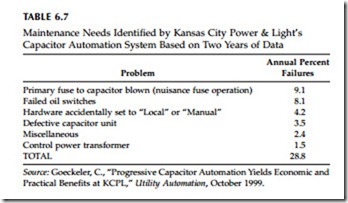Reliability
Several problems contribute to the overall reliability or unreliability of capacitor banks. In a detailed analysis of Kansas City Power & Light’s automated capacitor banks, Goeckeler (1999) reported that blown fuses are KCP&L’s biggest problem, but several other problems exist (Table 6.7). Their automa-
tion with two-way communications allowed them to readily identify bank failures. The failure rates in Table 6.7 are high, much higher than most distribution equipment. Capacitor banks are complicated; they have a lot of equipment to fail; yet, failure rates should be significantly better than this. An EPRI survey on capacitor reliability found wide differences in utilities’ experience with capacitors (EPRI 1001691, 2002). Roughly one-third of sur- vey responses found feeder capacitors “very good,” another one-third found them “typical of line equipment,” and the final third found them “problematic.” The survey along with follow-up contacts highlighted several issues:
• Misoperation of capacitor fuses — Many utilities have operations of fuses where the capacitor bank is unharmed. This can unbalance circuit voltages and reduce the number of capacitors available for var support. Review fusing practices to reduce this problem.
• Controllers — Controllers were found “problematic” by a significant number of utilities. Some utilities had problems with switches and with the controllers themselves.
• Lightning and faults — In high-lightning areas, controllers can fail from lightning. Controllers are quite exposed to lightning and power-supply overvoltages during faults. Review surge protection practices and powering and grounding of controllers.
• Human element — Many controllers are set up incorrectly. Some controllers are hard to program. And, field crews often do not have the skills or proper attitudes toward capacitors and their controls. At some utilities, crews often manually switch off nearby capacitors (and often forget to turn them back on after finishing their work). To reduce these problems, properly train crews and drive home the need to have capacitors available when needed.
